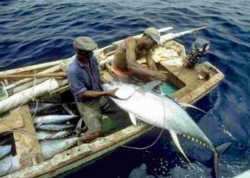|
afrol News, 27 January - A great number of African countries has fisheries agreements with Japan, the European Union and other industrialised countries; mostly paying little for overfishing and environmentally harmful practices. Environmentalists now urge rich countries to give Africa better fishing deals. - EU Fisheries Ministers must give the European Commission a strong mandate to urgently and rigorously implement its plans for improving fishing agreements with developing countries, Julian Scola of the environmental group WWF said today. The plans, to be outlined as a Communication by Commissioner Fischler during the Agriculture Council meeting starting today, are a response to a 1997 Council conclusion on fishing access agreements. In a letter to George Drys, the Greek President of the Agriculture-Fisheries Council, WWF International's President, Chief Emeka Anyaoku, says: "WWF naturally supports the idea of transforming commercial fisheries agreements with developing countries into partnership agreements to ensure sustainable fisheries. WWF particularly welcomes the commitment to conduct sustainability impact assessments for new fisheries agreements." However, the environmentalists were concerned that some EU member states wanted a big expansion of European fishing in the waters of developing countries. Therefore, the WWF letter asked that sustainability impact assessments were made before new deals were signed. - New or renewed fishing agreements should not lead to overfishing or overcapacity in the region, the group added. The EU should further assist African countries to develop national, or regional, fisheries policy and management plans that include the ecosystem as a whole, not just individual commercial stocks.
The EU currently has fishing agreements with some 15 developing countries in Africa, the Indian Ocean and the Pacific. The Europeans pay anywhere between 0.4 million and 80 million euro a year for access. In 2000, these agreements cost the EU a total of 137 million euro. However, "in too many cases" there was "no limit on the amount of fish that can be caught," WWF complained. According to the group, "some, if not all, of the agreements contribute to overfishing, represent unfair competition to local fishermen, do not offer a fair price to developing countries, and are in conflict with EU development policies." The main beneficiary of fishing access agreements with African countries is Spain, followed by France. Lesser beneficiaries include Portugal, Italy, and Greece. The UK and Ireland are very minor beneficiaries of these EU deals. - Africa is looking to Europe to establish a fisheries access policy that will balance environment and development concerns, says Chief Emeka Anyaoku. "The EU Communication on fisheries partnerships with third countries can, properly implemented, help to ensure fairer, sustainable agreements between the EU and developing countries in the coming years," he adds. Sources: Based on WWF and afrol archives
|
front page
| news
| countries
| archive
| currencies
| news alerts login
| about afrol News
| contact
| advertise
| español
©
afrol News.
Reproducing or buying afrol News' articles.
You can contact us at mail@afrol.com

